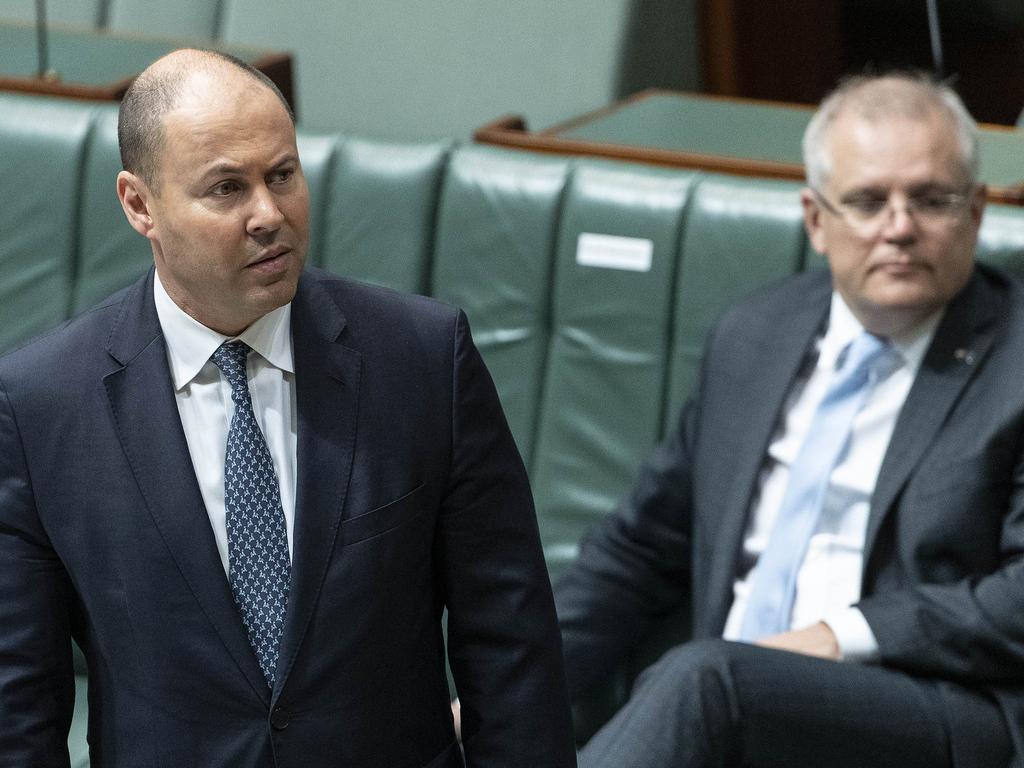
As I will explain below, a new low-cost money-raising mechanism has emerged with the potential to help many participants in the cash race.
But first, the race needed rule clarification. Late on Wednesday, in answer to a question from me, Treasurer Josh Frydenberg virtually fired the starter’s gun by clarifying the rules and keeping a vast number of small enterprises in the JobKeeper game.
Until the Frydenberg declaration there were sentences in the JobKeeper explanation that accountants believed might have excluded those filing BAS statements quarterly from selecting the monthly option.
That meant they would have to raise sufficient funds to fund their full staff from March 31 until June 30 — a virtual impossibility given that, at the same time, the business had to experience a 30 per cent fall in turnover to gain a JobKeeper entitlement.
Frydenberg, via a staff member, made this written declaration to me: “You asked whether the JobKeeper rules require a business to measure the decline in turnover for the same period that they measure their BAS (which for small business is quarterly).
“As you point out the rules are very clear. Paragraph 8 (7) (a) of the rules sets out that the turnover test period must be:
(i) a calendar month that ends after 30 March 2020 (ie, month ending March 31 is fine) and before 1 October 2020 or;
(ii) a quarter that starts on 1 April 2020 or 1 July 2020.
“Likewise the explanatory statement accompanying the rules makes it clear that either a monthly or quarterly basis can be used.”
At this point, along with many accountants, I disagree that the explanatory statement was clear — ambiguous sentences were included. But it is now very clear and that’s all that matters.
When last night I phoned an SME business person to reveal the Frydenberg declaration, he almost broke down in tears because his accountant’s interpretation of the explanatory statement threatened to destroy his business. Many thanks, Treasurer.
The rules for the race for cash are now set — if your March or April month revenue has fallen by 30 per cent you need to have paid your staff, including those already stood down, from March 30 to mid-May when the JobKeeper money is scheduled to arrive at rate of $1500 a fortnight — backdated to March 30. (You can backdate paying April wages by paying at the end of the month). Those using the month of April must issue a BAS statement by May 7 (not easy) and the JobKeeper money will flow for six months, hopefully starting a week or so later. You can clock in during later months but you will not receive the full six months JobKeeper payments.
The first port of call for businesses that need to borrow the cash will be the banks. They should help but unfortunately some are being tardy when they already have large exposures to struggling enterprises.
If your bank is playing hard- ball try others or go to a non-bank. Many are being very helpful. The trouble is that the banks and non-banks are being deluged by small businesses wanting to fund the six-weeks wages bill, which includes recalling stood down staff and higher payments for low-paid staff or casuals.
Unfortunately the total concentration on COVID-19 has delayed the government’s fast payment thrust. A large number of large enterprises want to pay faster but have downgraded the priority just when smaller enterprises most need help.
Many will be forced to pay money sharks interest rates of between 12 and 30 per cent to get the cash.
But I have discovered a service whereby small enterprises can gain quick payment at a discount rate of 0.3 per cent a month — an annual interest rate of 3.6 per cent. It’s a virtual marketplace called Earlytrade started by Guy Saxelby and Piers Symons in 2016.
Earlytrade’s clients include 37,000 small enterprises supplying goods and services to operations like Coles, Beston Foods, Asahi, Steinlager, King Island Dairy, XXXX, Veolia, Schweppes, Dairy Farmers and Peroni. Demand has risen sixfold in the last month.
CEO Guy Saxelby told me: “We’ve not seen transaction volumes spike like this before. Forget toilet paper, everyone wants early payment.”
Earlytrade is not a lending operation but a marketplace. Each day operations like Lion, which cover many of the brands listed above, announce electronically that they have a sum of cash available to immediately pay debts that are owed in, say, 30 days. Registered small enterprise suppliers bid for immediate payment but there is a cap of a monthly discount rate of 0.3 per cent.
The Earlytrade market makes the decision as to whether an enterprise is “small”. Large enterprises with cash in the bank are getting only 1 per cent on their money — if they are lucky. This way they get an effective annual rate of 3.6 per cent. Everyone wins.
Many large companies are looking around for ways to help their small suppliers get through the pandemic. Often small suppliers number thousands but in fact are a small fraction of total turnover.
This is one way large enterprises can help the employment generators in the community and solve the immediate administration complexities.








The great cash race is on. The employment-generating hub of Australia — small and medium business — is engaged in a desperate chase for money to cover the cost of labour for the six weeks from March 30 to mid-May to qualify for JobKeeper.